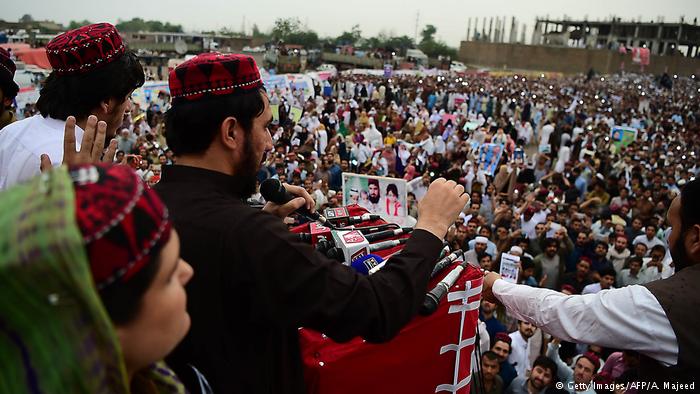
Time and time again non-Punjabi Pakistanis have always felt they were treated as second class citizens. When something happens in Punjab, everyone including the media pays attention but when something happens in another part of the country it does not matter. Nothing exemplifies this better than then the media ignoring the plight of the Baluch and the Pashtuns. The four month old Pashtun Tahaffuz Movement (PTM) protest march has been ignored by the mainstream media.
The Pashtun Tahaffuz Movement started in 2014, initially as an initiative to clear land mines in the border areas but in January 2018 it turned into a demand for justice after the extrajudicial killing by police force in Karachi of a young Pashtun, Naqeebullah Mehsud.
According to a report in the German paper Deutsche Welle, PTM is a secular movement, led by young activist Manzoor Pashteen, that “has struck a chord with thousands of Pashtuns, who say “enough is enough.” The Pashtun Tahafuz Movement (Movement for the Protection of Pashtuns, PTM) blames both the Pakistani military and Islamists for the destruction in their region. Essentially an anti-war campaign, the PTM sprang up as a result of the killing of the 27-year-old Naqeebullah Masood, who was killed by police in the southern city of Karachi on January 20. The authorities claimed Masood had links with militants, a charge his family and civil society activists deny. Rights groups say that thousands of Pashtun youths have been murdered or abducted by security agencies in the past decades on unproven terrorism charges. State authorities use the pretext of war on terrorism to persecute Pashtuns, they say. Over the years, Pashtuns have been branded as Islamists, or militants, due to the fact that the Taliban are also a Pashtun-dominated outfit, and because the radicalism in the country’s northern areas has spiked over the years as a result of decades-long wars.”
According to Senator Usman Kakar of the Pakhtunkhwa Milli Awami Party The PTM “demands that all ‘missing’ Pashtuns should be produced before the court of law. It demands that all landmines in the northwestern tribal areas be cleared and the army stops demolishing Pashtuns’ houses on suspicion of militant links,” Kakar told DW. “The [Pashtun] anger had been simmering for years. If it wasn’t Pashteen, someone else would have started the movement,” Kakar said. “Mainstream Pashtun parties have an organizational structure and a political manifesto; the PTM doesn’t,” underlined Kakar, who admits that Pakistan’s political parties are fearful of this new movement in a strategically important province. “Pashtun nationalist parties usually do not want to offend the military because it could affect their political role. But Pashteen’s claim to fame is that unlike other politicians he is clear about what he wants,” Kakar said.”
And yet as an Editorial in Daily Times stated the media blackout of the PTM’s rally “will be remembered for its betrayal of all the principles that underlie the profession of journalism. None of the channels did justice, in their coverage, to the largest political gathering of the day held by the Pushtun Tahaffuz Movement (PTM). While live coverage was given to much smaller rallies of the PTI and the PPP as well as the youth convention of an extreme right-wing party that is at the very verge of oblivion, the largest political movement to have emerged in the country after the 2007-08 lawyers’ movement was blacked out. This must stay with the country’s media as an embarrassment and should make media professionals, as a collective, do some soul searching about their profession. PTM’s Sunday rally was without a doubt the biggest political show in the city of Peshawar in recent history. When so many Pakistanis gather in a public arena and demand nothing more than a right to dignified existence, our state institutions must understand that something must have been terribly wrong with their policies vis-à-vis the region. Instead of going on the defensive, the institutions will do well to listen patiently to the grievances of these persecuted and war-torn citizens of the republic. The protesters have been explaining their demands again and again, and the authorities have yet to meet them even half way through. Rao Anwar is under arrest and faces prosecution of Naqeebullah Mehsud’s murder. But that is not the only crime he has been accused of. A good faith effort from the state will require a thorough investigation of all charges of extrajudicial murder against him and other officials. And Anwar is just the tip of the iceberg Manzoor Pashteen and his colleagues in PTM have pointed towards. Their complaints about enforced disappearances need to be addressed by ensuring safe return of those disappeared and action against those involved in the matter. Our institutions must prove, and do so quickly, that they are concerned about excesses committed by security personnel that have been highlighted by the PTM. Unfortunately, the pace at which the authorities are proceeding so far suggests otherwise. This must be addressed urgently, if Pakistan is to sustain gains made from the continuity of the democratic process in the last decade.”
![]()





